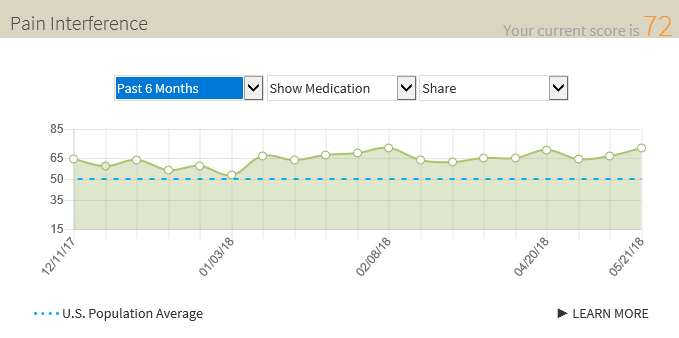Session Information
Session Type: Patient Perspectives Poster Session
Session Time: 12:00PM-2:00PM
Background/Diagnosis: As a patient with AS, Dawn founded #SpoonieChat to provide a space on twitter for people living with chronic diseases to support each other. One common theme in #SpoonieChat is the relationship between pain and sleep. ‘Painsomnia’ is a patient-generated term that addresses this cycle of pain and insomnia.
A follower of #SpoonieChat who experiences painsomnia is Shelley. Shelley was diagnosed with RA in 2012, following symptoms of symmetrical joint pain in hands and toes; fatigue, and malaise. After treatments including methotrexate, Plaquenil, and 5+ biologics, Shelley has made significant lifestyle changes and is currently on Rituximab. In addition to monthly bloodwork and physician exams, changes in Shelley’s treatment are based on her own data gathered by weekly symptom tracking.
To understand patients’ adaptations to manage painsomnia we used collective knowledge generated from #SpoonieChat with Shelley’s unique experiences as an individual patient recorded through patient reported outcomes measures via ArthritisPower.
Treatment: ArthritisPower is a patient-led, patient-generated, app-based research registry for arthritis, bone and inflammatory skin conditions and is free to use for patients like Shelley to track symptoms, to record subtle changes, to see how they are doing over a period of time whether on a new medication and/or in connection to sleep, physical function and other measures.
By tracking pain interference, Shelley has found pain to be interrelated with levels of fatigue, sleep quality, and cognitive issues, thereby negatively impacting her quality of life. Figure 1 shows Shelley’s pain interference scores over a six-month period. Shelley identifies the causes of fluctuations by also tracking dates of flares, steroid usage, periods of illness, and restful vacations.
Maintenance:
Through this approach, Shelley worked with her rheumatologist to lessen the symptoms and progression of RA. Shelley continues to track these elements through ArthritisPower to look for patterns influenced by medication and maintenance strategies including diet, exercise, decreasing stress, and increasing sleep. This provides the doctor with information beyond blood work, lab tests and swollen joint counts to work with Shelley in managing her condition and treating the things that matter to her to help her live a better quality of life.
Quality of Life:
Doctor and patient conversations can be more meaningful when patient experienced data is systematically collected and discussed. Data gathered through ArthritisPower gives patients like Shelley, an organized way to talk with their doctor on each of the indicators of pain and sleep which affect cognitive function, physical function, depression.
To cite this abstract in AMA style:
Fritz S, Carandang K, Gibson D. Using a Mobile App to Facilitate Patient-Doctor Discussions to Make Informed Decisions Regarding ‘Painsomnia’ [abstract]. Arthritis Rheumatol. 2018; 70 (suppl 9). https://acrabstracts.org/abstract/using-a-mobile-app-to-facilitate-patient-doctor-discussions-to-make-informed-decisions-regarding-painsomnia/. Accessed .« Back to 2018 ACR/ARHP Annual Meeting
ACR Meeting Abstracts - https://acrabstracts.org/abstract/using-a-mobile-app-to-facilitate-patient-doctor-discussions-to-make-informed-decisions-regarding-painsomnia/

